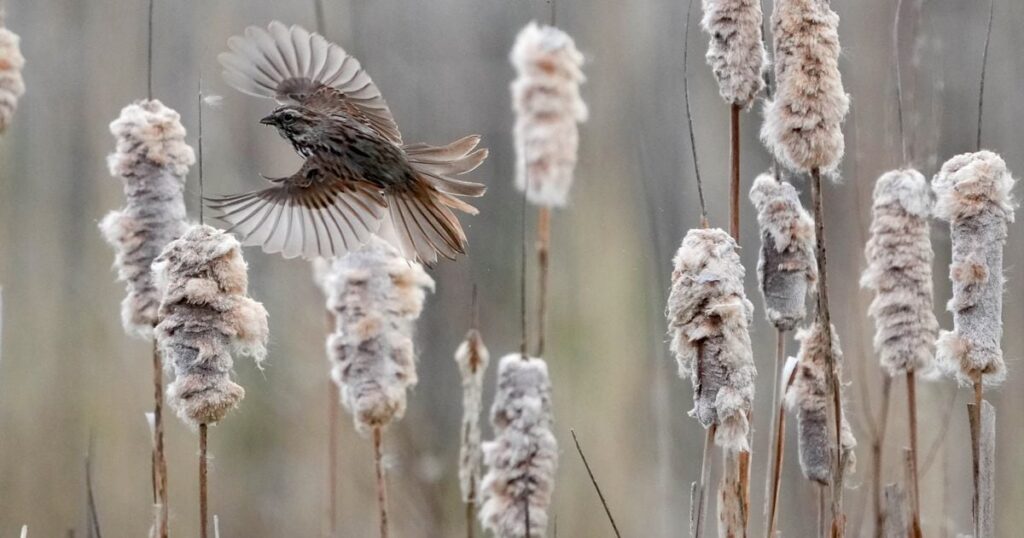Assuming that scientific knowledge is superior to indigenous wisdom makes collaboration impossible.
(Francisco Kyorses | The Salt Lake Tribune) A chirping sparrow flies among the cattails on Thursday, May 9, 2024, at the Great Salt Lake Shorelands Preserve near Layton.
Darren Parry | The Salt Lake Tribune
| May 24, 2024 12:05 pm
Over the past six months, I have been asked to take part in conferences on sustainability: I have given lectures, talks and panel discussions about the future of the world we live in.
As a Native American elder, storyteller and activist, my perspective is deeply rooted in the teachings of my people who have lived sustainably with the land for generations. Our relationship with the environment is sacred.
What I realized is that this capitalist system is not sustainable. I would even go so far as to say that the system itself, and the people who participate in it, know that it is not sustainable, and that is why we have sustainability offices in companies, schools, and governments to minimize the impact of our decisions when it comes to environmental stewardship.
While the current capitalist model tells us we can take, extract, deplete, develop and even destroy land there for short-term profit, we might need to ask ourselves whether we should do so, and if so, at what cost to future generations.
Maybe it's time to start putting a price on things that we're not estimating the cost of today. Estimate the dollar cost of what the development will do to air pollution. Estimate the dollar cost of how much more traffic it will add to our highways and railroads. How much water will it take to sustain that development for the next 50 years? And if the price future generations will pay is too high for the environment, maybe the development wasn't such a good idea after all. It's time to shift our thinking and think not just about people's health, but also about the health of the lakes and rivers and watersheds that feed our non-human kin.
Did you know that Iroquois leaders never make any decision without considering how it will impact seven generations into the future? If our leaders are governed like that, consider the impact it will have on our future. There is an old Native American proverb that says, “We do not inherit the earth from our ancestors, we borrow it from our children.” What kind of world will we leave them? What will their world be like?
By embracing the principles of community, stewardship, and sustainability inherent to indigenous cultures, we can pave the way for a more harmonious future. By forming new kinships, building new solidarities, and renewing relationships, we can address both social and environmental needs that our current capitalist system fails to address.
Scientists are finally discovering what tribal elders have been teaching for generations: we are all connected. Politicians are finally discovering what the Iroquois already knew: we must govern for future generations. We cannot sacrifice the future of our children and grandchildren for short-term gain. There is no science in the world that can overcome our selfish behavior.
We are in the midst of a major paradigm shift. Now is the time to blend Indigenous knowledge and our stewardship values with cutting-edge science and innovation to shape policies that will manage our water, environment and climate in the foreseeable future. This requires a collaborative approach that recognizes the importance of both knowledge systems. Collaboration will not be possible if we assume that scientific knowledge is superior to Indigenous wisdom.
The continued push for the proposed inland port and Bear River development not only threatens air pollution and road congestion, but also threatens to deplete precious water resources needed to sustain the Great Salt Lake.
Nearly a decade ago, the Standing Rock Sioux Tribe of South Dakota faced an environmental crisis. The movement was the largest gathering of Native Americans and allies in a century. A central theme that drew tens of thousands of people to join was “Mni wichoni,” or “water is life.” The phrase meant that the growth and prosperity promised by an oil pipeline was not worth sacrificing our sacred obligation to protect the water that nourishes us all.
While some fossil fuels are unavoidable and will be necessary until other forms of green energy are developed, investing in green infrastructure, promoting renewable energy, and implementing water conservation measures can help protect the environment and ensure local communities thrive without sacrificing our natural and cultural resources. These solutions respect the Earth, protect it for future generations, and foster a legacy of environmental stewardship and justice.
(Photo by Darren Parry) Darren Parry is past chairman of the Northwest Band of Shoshone Nation.
Darren Parry is a past president of the Northwestern Shoshone Band. Darren sits on the Board of Directors for Utah Humanities and PBS Utah. He attended the University of Utah and Weber State University, where he received his Bachelor of Education. In 2024, he was awarded an Honorary Doctorate of Education from Utah State University. Darren is the author of “Bear River Massacre, A Shoshone History” and teaches in the Department of Environmental Humanities at the University of Utah. He speaks nationally on Native American issues surrounding history and Indigenous perspectives on sustainability.
The Salt Lake Tribune is committed to creating a space where Utahns can share ideas, perspectives and solutions that move our state forward. To do this, we need your insight. Learn how you can share your voice here and email us at voices@sltrib.com.



